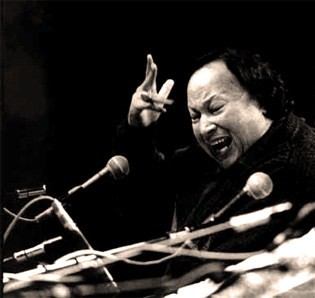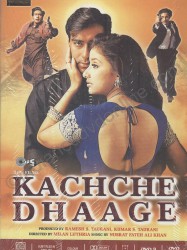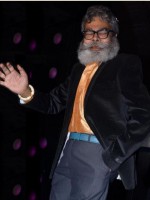Nusrat Fateh Ali Khan est un Acteur et Son Pakistanais né le 13 octobre 1948 à Faisalabad (Pakistan)

Nusrat Fateh Ali Khan (Punjabi: نصرت فتح علی خان (13) October 1948 – 16 August 1997), an internationally acclaimed Pakistani musician, was primarily a singer of Qawwali, the devotional music of the Sufis. Considered one of the greatest voices ever recorded, he possessed an extraordinary range of vocal abilities and could perform at a high level of intensity for several hours. Extending the 600-year old Qawwali tradition of his family, Khan is widely credited with introducing Qawwali music to international audiences.
[...]Voir plus...
Khan was born on 12 July 1948 in the city of Faisalabad, shortly after the Partition of India. He was the fifth child and first son of Fateh Ali Khan, a musicologist, vocalist, instrumentalist, and Qawwal. Khan's family, which included four older sisters and a younger brother, Farrukh Fateh Ali Khan, grew up in central Faisalabad. Initially, his father did not want Khan to follow the family's vocation. He had his heart set on Khan choosing a much more respectable career path and becoming a doctor, because he felt Qawwali artists had low social status.
[...]Voir plus...
Source : Wikidata
Nusrat Fateh Ali Khan

- Infos
- Photos
- Meilleurs films
- Famille
- Personnages
- Récompenses
Nom de naissance Parvez Fateh Ali Khan
Nationalité Pakistan
Naissance 13 octobre 1948 à Faisalabad (Pakistan)
Mort 16 aout 1997 (à 48 ans) à Londres (Royaume-uni)
Nationalité Pakistan
Naissance 13 octobre 1948 à Faisalabad (Pakistan)
Mort 16 aout 1997 (à 48 ans) à Londres (Royaume-uni)
Nusrat Fateh Ali Khan (Punjabi: نصرت فتح علی خان (13) October 1948 – 16 August 1997), an internationally acclaimed Pakistani musician, was primarily a singer of Qawwali, the devotional music of the Sufis. Considered one of the greatest voices ever recorded, he possessed an extraordinary range of vocal abilities and could perform at a high level of intensity for several hours. Extending the 600-year old Qawwali tradition of his family, Khan is widely credited with introducing Qawwali music to international audiences.
[...]Voir plus...
Biographie
Early life and careerKhan was born on 12 July 1948 in the city of Faisalabad, shortly after the Partition of India. He was the fifth child and first son of Fateh Ali Khan, a musicologist, vocalist, instrumentalist, and Qawwal. Khan's family, which included four older sisters and a younger brother, Farrukh Fateh Ali Khan, grew up in central Faisalabad. Initially, his father did not want Khan to follow the family's vocation. He had his heart set on Khan choosing a much more respectable career path and becoming a doctor, because he felt Qawwali artists had low social status.
[...]Voir plus...
Le plus souvent avec
Filmographie de Nusrat Fateh Ali Khan (5 films)
Acteur

Aur Pyaar Ho Gaya (1997)
, 2h33Réalisé par Rahul Rawail
Genres Drame, Romance
Acteurs Bobby Deol, Aishwarya Rai, Shammi Kapoor, Anupam Kher, Priya Tendulkar, Nusrat Fateh Ali Khan
Note46%





Aur Pyaar Ho Gaya revolves around a progression of love between the two protagonists, Bobby Oberoi (Bobby Deol) and Ashi (Aishwarya Rai). Ashi is a free-spirited woman, in her early twenties, who has no plans to get married soon. Her father, Kailashnath (Anupam Kher), is traditional and believes important things in life, such as marriage, should adhere to the family's customs. He expresses his desire of marriage for Ashi and tells her he has a guy picked out for her, Rohit Malhotra. Ashi gets enraged at first, and then agrees to the marriage on the condition that she be allowed to meet him anonymously and observe his character and personality.
[...]Voir plus...
Son

Kachche Dhaage (1999)
, 2h28Réalisé par Milan Luthria
Genres Drame, Thriller, Action, Romance
Thèmes La musique, Musique, Bollywood
Acteurs Ajay Devgn, Saif Ali Khan, Manisha Koirala, Namrata Shirodkar, Sadashiv Amarapurkar, Govind Namdev
Note59%





Aaftab (Ajay Devgan ) and Dhananjay (Saif Ali Khan) are two step brothers who meet for the first time. Each one has a selfish approach to life; Aaftab is a petty smuggler, specializing in smuggling goods across the Rajasthan border into Pakistan whilst Dhananjay is a corporate yuppy from the city, with a high-flying lifestyle. Aaftab is in love with Rukshana (Manisha Koirala), but is rejected by her family because he is illegitimate. Dhananjay is dating Ragini (Namrata Shirodkar) and has his father's death to contend with.

Kartoos (1999)
Réalisé par Mahesh Bhatt
Genres Thriller, Action, Policier
Thèmes La musique, Musique, Bollywood
Acteurs Sanjay Dutt, Gulshan Grover, Jackie Shroff, Manisha Koirala, Dina Pathak, Jaspal Bhatti
Note51%





Face à l'impuissance de la police à s'emparer de Jagat Jogia, un gangster qui organise des attentats terroristes, l'inspecteur Jay Suryavanshi se résout à recruter un tueur endurci, Jeet Balraj. En échange de l'élimination du malfaiteur, Jay lui offre une nouvelle identité et la liberté. Au cours de sa traque, Jeet fait la connaissance de Mini dont il tombe amoureux et, par amour pour elle, décide d'abandonner ses activités criminelles une fois sa mission accomplie. Mais sa situation devient extrêmement périlleuse quand Jagat Jogia s'aperçoit qu'il le pourchasse et que Jay Suryavanshi projette de s'en débarrasser plutôt que de tenir sa promesse.

Aur Pyaar Ho Gaya (1997)
, 2h33Réalisé par Rahul Rawail
Genres Drame, Romance
Acteurs Bobby Deol, Aishwarya Rai, Shammi Kapoor, Anupam Kher, Priya Tendulkar, Nusrat Fateh Ali Khan
Note46%





Aur Pyaar Ho Gaya revolves around a progression of love between the two protagonists, Bobby Oberoi (Bobby Deol) and Ashi (Aishwarya Rai). Ashi is a free-spirited woman, in her early twenties, who has no plans to get married soon. Her father, Kailashnath (Anupam Kher), is traditional and believes important things in life, such as marriage, should adhere to the family's customs. He expresses his desire of marriage for Ashi and tells her he has a guy picked out for her, Rohit Malhotra. Ashi gets enraged at first, and then agrees to the marriage on the condition that she be allowed to meet him anonymously and observe his character and personality.
[...]Voir plus...

La reine des bandits (1995)
, 1h59Réalisé par Shekhar Kapur
Origine Inde
Genres Drame, Erotique, Biographie, Action, Historique, Policier, Western
Thèmes Féminisme, La musique, Politique, Sexualité, Le viol, Erotique, Musique, Rape and revenge, Politique, Bollywood, Auto-justice
Acteurs Seema Biswas, Nirmal Pandey, Aditya Srivastava, Hemant Pandey, Dolly Ahluwalia, Saurabh Shukla
Note74%





Le 12 février 1983, le hors-la-loi le plus célèbre et le plus redouté de l'Inde se livre à la police. Il s'agit d'une femme, Phoolan Devi (Seema Biswas), surnommée la Reine des Bandits. Née au cœur d'une famille issue de caste inférieure, comment a-t-elle fait, pendant cinq ans pour régner sur le fleuve Chambal et terroriser la caste dirigeante, pour devenir un tel symbole de la révolte et du combat ?

جو ڈر گیا وہ مرگیا (1995)
Origine Pakistan
Acteurs Neeli, Nadeem Baig, Reema Khan, Javed Sheikh, Babar Ali, Atiqa Odho
Note38%





 Connexion
Connexion




